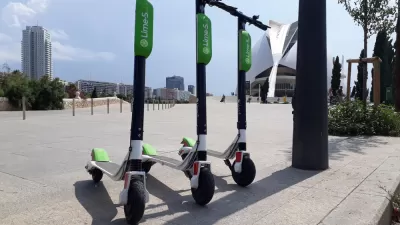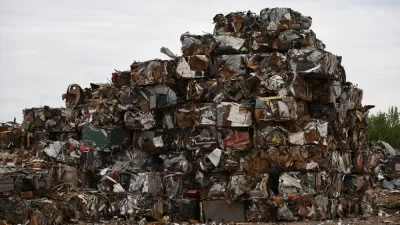Houston's 14 percent recycling rate is downright dismal (San Francisco's is 80 percent). The city's entry in the Bloomberg Philanthropies' Mayor's Challenge seeks to change this by taking the onus off of individuals to decide what's recyclable.
Ariel Schwartz reports on Houston's Total Reuse initiative, a program that pulls together existing technologies to create a new paradigm in waste disposal. If the project is successful, it could raise that dismal recycling rate to 75 percent.
"Instead of trying to overhaul local culture and regulation, the city is working on an ambitious plan to build the first total material resource recovery facility--an innovation that would allow residents to toss all their trash into a single bin, let technology to do all the sorting, and emerge in the end with usable products," says Schwartz.
Based on extensive research into what other metropolises have implemented, Laura Spanjian, Houston’s sustainability director, developed a system that "combines many of these technologies: It would take everyone’s trash in one bin and send it to a facility that pulls out every piece of recyclable material and separates out food waste. Recyclable commodities would be sold, and food waste would be turned into compost or put in an anaerobic digester to power facilities or trucks. Another portion of the waste would be turned into gasoline."
"Spanjian says that she would be thrilled if Houston won the $5 million Mayor’s Challenge, but that the process is going ahead regardless. 'Having the grand prize money would help us go faster, help us implement to initial pieces that much quicker,' she says. 'But we’re on a path to implement this.'"
FULL STORY: Houston’s Plan To Make Landfills Extinct

Study: Maui’s Plan to Convert Vacation Rentals to Long-Term Housing Could Cause Nearly $1 Billion Economic Loss
The plan would reduce visitor accommodation by 25,% resulting in 1,900 jobs lost.

North Texas Transit Leaders Tout Benefits of TOD for Growing Region
At a summit focused on transit-oriented development, policymakers discussed how North Texas’ expanded light rail system can serve as a tool for economic growth.

Why Should We Subsidize Public Transportation?
Many public transit agencies face financial stress due to rising costs, declining fare revenue, and declining subsidies. Transit advocates must provide a strong business case for increasing public transit funding.

How to Make US Trains Faster
Changes to boarding platforms and a switch to electric trains could improve U.S. passenger rail service without the added cost of high-speed rail.

Columbia’s Revitalized ‘Loop’ Is a Hub for Local Entrepreneurs
A focus on small businesses is helping a commercial corridor in Columbia, Missouri thrive.

Invasive Insect Threatens Minnesota’s Ash Forests
The Emerald Ash Borer is a rapidly spreading invasive pest threatening Minnesota’s ash trees, and homeowners are encouraged to plant diverse replacement species, avoid moving ash firewood, and monitor for signs of infestation.
Urban Design for Planners 1: Software Tools
This six-course series explores essential urban design concepts using open source software and equips planners with the tools they need to participate fully in the urban design process.
Planning for Universal Design
Learn the tools for implementing Universal Design in planning regulations.
City of Santa Clarita
Ascent Environmental
Institute for Housing and Urban Development Studies (IHS)
City of Grandview
Harvard GSD Executive Education
Toledo-Lucas County Plan Commissions
Salt Lake City
NYU Wagner Graduate School of Public Service





























